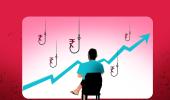'It's crucial to adhere to your trading plan, even when faced with emotional turmoil.'
'The market can be incredibly volatile and it's easy to get swayed by fear and greed.'

Mukta Dhamankar didn't exactly chart a conventional path to understanding the stock market. The 47 year old's journey began with a childhood ritual that unknowingly laid the foundation for her future.
Her grandfather, an astutely observant person, recognised a spark of meticulousness in young Mukta. He tasked her with a seemingly mundane chore: To diligently note down stock prices as they were announced on the radio.
"It was like a secret code, a glimpse into a world beyond the everyday," she recalls, "a world that spun with numbers and information."
While the significance of these numbers might have escaped her then, the act of observing, recording and paying attention to detail instilled a quiet fascination in Mukta about the ups and downs of the stock market.
Years later, with a master's degree in nutrition, she found herself yearning for a more dynamic and challenging path. The stock market, with its inherent challenges and the potential for intellectual and financial growth, presented an immediate opportunity.
From a novice trader who succumbed to the temptations of greed and fear to a disciplined, process-based trader, Mukta's journey is a testament to the power of perseverance and a relentless pursuit of knowledge.
From recording stock prices as a child to navigating the complexities of the modern market, she has demonstrated that, with dedication and a structured approach, anyone can unlock their potential in the world of trading.
Mukta discusses her trading journey with Prasanna D Zore/Rediff.com.
Your journey as a stock market trader has a unique beginning. Could you tell us about your earliest interactions with the world of finance?
It's interesting how seemingly insignificant childhood experiences can shape our future.
My grandfather, a wise man, recognised my meticulous nature. He would have me listen to the radio and diligently note down the stock prices as they were announced. He knew my father would appreciate having a readily available list of prices to consider for his investment decisions.
At that age, I didn't fully grasp the significance of these numbers but the act of observing and recording them, the attention to detail it demanded, subtly instilled within me an interest in the dynamics of the market.
It was an almost subconscious introduction, a glimpse into a world beyond the everyday, a world that was full of numbers and information.
How did this childhood experience translate into your decision to pursue trading as a profession, given your academic background in nutrition?
My academic background lies far from the realm of finance. I hold a master's degree in nutrition, a field that demands a deep understanding of the human body and its intricate systems.
However, the seed of interest, sown during those childhood days of recording stock prices, gradually blossomed. There was a yearning for something more, a desire for financial independence and a quest to explore a different facet of my capabilities.
The stock market, with its inherent challenges and the potential for intellectual and financial growth, presented an intriguing opportunity.
You mentioned that your initial foray into trading involved relying heavily on candlestick charts and technical indicators like RSI (Relative Strength Index). Could you describe the challenges you encountered during this phase?
Initially, my approach was largely intuitive and reactive.
I was captivated by the visual nature of the candlestick charts, their intricate patterns promising insights into market movements. I experimented with technical indicators like RSI, attempting to decipher their signals and predict market trends.
However, I soon realised that this approach lacked a solid foundation.
Trading based primarily on emotions and hunches proved to be a perilous endeavour. I often found myself making impulsive decisions, entering and exiting trades based on fleeting market noise or a gut feeling. This, inevitably, led to numerous losses.
One particularly painful experience involved a blue-chip stock. I bought into it after a significant price correction, convinced it was a buying opportunity. However, the stock continued to decline, resulting in a substantial loss -- around 40 per cent of my portfolio.
This experience was a harsh reality check. It highlighted the importance of a disciplined approach and the dangers of trading based on emotions. It taught me that trading is not merely about identifying patterns and setups; it's about understanding the underlying market forces, the market context in which price action takes place and developing a robust, emotion-free strategy.
How did you navigate these challenges and become the disciplined trader you are today?
Overcoming these initial setbacks required a significant shift in my approach. I realised I needed a more structured and objective framework for my trading decisions.
This led me to explore tools like point and figure charts and Renko charts.
These charting methods, unlike traditional candlestick charts, filter out noise and present price action in a more concise and objective manner. For instance, in a point and figure chart, price movements are plotted only when they reach a certain predefined price level. This eliminates minor fluctuations and focuses on significant price moves.
Similarly, Renko charts represent price movements as a series of bricks printed diagonally, filtering out minor fluctuations and providing a clearer picture of the overall trend.
By incorporating these tools, I was able to identify clear entry and exit points, reducing the influence of emotions, improving my decision-making process and making them objective.
Could you elaborate on the concepts of relative strength and breadth analysis and how they have shaped your trading strategy?
Relative strength analysis is a powerful tool that helps me identify the strongest performing sectors or stocks within a given market.
I compare the performance of individual stocks or sectors to a benchmark index, such as the Nifty 50. For example, if the IT sector is significantly outperforming the Nifty 50, it indicates sector strength. I then focus my attention on identifying the strongest stocks within that outperforming sector.
Breadth analysis provides a broader perspective of the market sentiment. It analyses the number of stocks advancing or declining within an index. If a majority of stocks within an index are advancing, it suggests a bullish market sentiment.
By combining the relative strength and breadth analysis, I can identify the most promising trading opportunities and time my entries effectively.
If the market is bullish and the IT sector is outperforming, I would prioritise trading opportunities within that sector, focusing on stocks that exhibit strong relative strength in the IT sector.
What are your key success mantras as a trader?
Discipline is undoubtedly the cornerstone of my success. It's crucial to adhere to your trading plan, even when faced with emotional turmoil.
The market can be incredibly volatile and it's easy to get swayed by fear and greed. I constantly remind myself that the market will always be there. There's no need to rush into trades or panic sell. Patience is key.
Money management is another crucial aspect. Overtrading can quickly erode your capital. I always ensure that my risk per trade is within acceptable limits.
I never risk more than a predefined percentage of my portfolio on any single trade, regardless of how confident I am in the setup.
This disciplined approach has been instrumental in preserving my capital and ensuring long-term sustainability.
What advice would you offer to aspiring traders based on your own experiences and learnings?
My advice to aspiring traders would be to focus on developing a robust trading plan and adhere to it rigorously.
Back-test your strategies extensively on historical data to assess their effectiveness and identify potential pitfalls.
The market is constantly evolving so continuous learning is essential. Stay updated on market trends, read extensively and adapt your strategies as needed.
Can you share a specific instance where you made a significant mistake early in your trading career and the valuable lesson you learned from that experience?
One of the most significant mistakes I made early on was the tendency to average down in losing trades. I would often buy more of a stock that was already declining, hoping to lower my average cost and eventually recoup my losses.
This, of course, is a dangerous strategy. Instead of cutting my losses and moving on, I was doubling down on a losing trade, further increasing my risk.
This experience taught me the importance of strict risk management and the need to cut losses quickly. It's crucial to recognise when a trade is not working and exit the position to minimise potential losses.
How did you manage to overcome the psychological challenges of trading, such as fear and greed?
Overcoming the psychological challenges of trading has been a continuous process.
Fear and greed are inherent human emotions and they can significantly impact trading decisions.
To reduce their influence, I've developed a few strategies.
Firstly, I maintain a disciplined approach, adhering to my pre-defined rules and avoiding impulsive decisions.
Secondly, I prioritise self-care and ensure I have a healthy work-life balance. This helps me maintain a clear mind and avoid emotional trading.
Finally, I keep a trading journal to track my trades, analyse my performance and identify areas for improvement. This helps me understand my own biases and make more objective decisions.
Can you describe the feeling of experiencing your first significant profitable trade? Did it change your perspective or approach to trading?
My first significant profitable trade was a euphoric experience. It provided a sense of validation and boosted my confidence.
However, I was cautious not to let this success cloud my judgment.
I analysed the trade meticulously, noting the factors that contributed to its success.
I documented my thought process, the entry and exit points and the risk-reward ratio.
This meticulous documentation has become an integral part of my trading routine. I maintain a detailed journal of every trade, both profitable and loss-making. This helps me identify recurring patterns, understand my strengths and weaknesses and continuously refine my trading strategy.
Looking back at your journey, what advice would you give to someone who is just starting out in the world of trading?
My advice would be to start small and grow gradually.
Begin with a small portion of your capital and gradually increase your position size as you gain experience and confidence.
Focus on building a solid foundation of knowledge and understanding before venturing into complex trading strategies.
1. Maintain discipline
2. Follow a well-defined process
3. Use proper stop-losses
4. Practise sound money and risk management
5. Know your exit before entering a trade
6. Explore relative strength concepts and breadth analysis
These tools are often underutilised but can be incredibly valuable in timing trades and understanding market dynamics.










 © 2025
© 2025